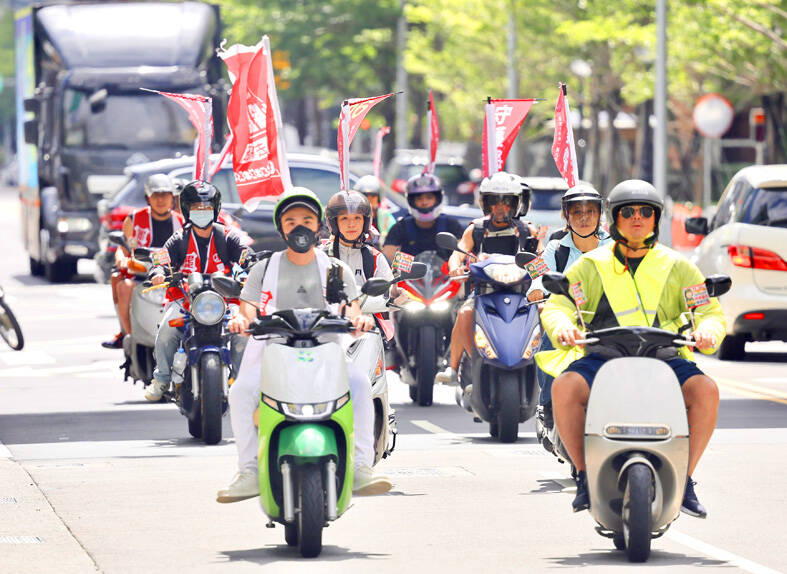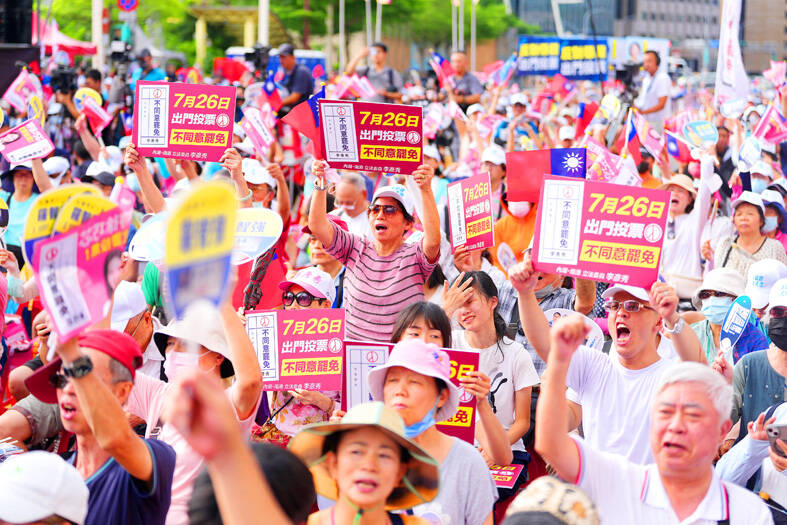A coalition of civic groups yesterday held a motorbike parade in Taipei and New Taipei City to support a campaign to recall opposition lawmakers before a nighttime rally near the Legislative Yuan in Taipei.
Twenty-four Chinese Nationalist Party (KMT) lawmakers and suspended Hsinchu Mayor Ann Kao (高虹安), formerly a member of the Taiwan People’s Party (TPP), face recall votes on July 26 and two KMT lawmakers face recall votes on Aug. 23.
Fang Po-hsiang (方柏翔), who led the campaign targeting KMT Legislator Hung Meng-kai (洪孟楷), said the parade was a “show of civic strength” and recognition that Taiwanese “share a common destiny.”

Photo: CNA
The groups hope to achieve collective success in recalling all KMT lawmakers targeted in this month’s votes, Fang said.
The campaigners are stepping up their social media work and ground game, including knocking on doors, touring traditional markets and speaking publicly among other activities, he said.
The effort would ramp up until voting day, he added.

Photo: CNA
Meanwhile, Democratic Progressive Party (DPP) spokespeople Justin Wu (吳崢) and Cho Kuan-ting (卓冠廷) attended a separate pro-recall convoy organized by the Taiwan Anti-Communist Defense Alliance to travel throughout Taiwan proper. The motorcade traveled from Hualien to Taitung yesterday.
Wu and Cho shouted slogans, emphasizing that all loyal supporters of the Republic of China should join the recall campaign.
In Taipei, KMT Chairman Eric Chu (朱立倫) attended a rally opposing the recalls hosted by the KMT, accusing President William Lai (賴清德) of politicking instead of doing his job.
The DPP government is backing the recall campaign to “flip the table” to negate its defeats in last year’s legislative elections, Chu said, adding that Lai is making himself a dictator by calling his opponents “impurities.”
TPP Chairman Huang Kuo-chang (黃國昌), invited by the KMT to participate in its rally, accused Lai of trying to create internal enemies and called on voters to reject the DPP at the polls by casting “No” in the recalls.

The manufacture of the remaining 28 M1A2T Abrams tanks Taiwan purchased from the US has recently been completed, and they are expected to be delivered within the next one to two months, a source said yesterday. The Ministry of National Defense is arranging cargo ships to transport the tanks to Taiwan as soon as possible, said the source, who is familiar with the matter. The estimated arrival time ranges from late this month to early next month, the source said. The 28 Abrams tanks make up the third and final batch of a total of 108 tanks, valued at about NT$40.5 billion

Two Taiwanese prosecutors were questioned by Chinese security personnel at their hotel during a trip to China’s Henan Province this month, the Mainland Affairs Council (MAC) said yesterday. The officers had personal information on the prosecutors, including “when they were assigned to their posts, their work locations and job titles,” MAC Deputy Minister and spokesman Liang Wen-chieh (梁文傑) said. On top of asking about their agencies and positions, the officers also questioned the prosecutors about the Cross-Strait Joint Crime-Fighting and Judicial Mutual Assistance Agreement, a pact that serves as the framework for Taiwan-China cooperation on combating crime and providing judicial assistance, Liang

A group from the Taiwanese Designers in Australia association yesterday represented Taiwan at the Midsumma Pride March in Melbourne. The march, held in the St. Kilda suburb, is the city’s largest LGBTQIA+ parade and the flagship event of the annual Midsumma Festival. It attracted more than 45,000 spectators who supported the 400 groups and 10,000 marchers that participated this year, the association said. Taiwanese Designers said they organized a team to march for Taiwan this year, joining politicians, government agencies, professionals and community organizations in showing support for LGBTQIA+ people and diverse communities. As the first country in Asia to legalize same-sex

MOTIVES QUESTIONED The PLA considers Xi’s policies toward Taiwan to be driven by personal considerations rather than military assessment, the Epoch Times reports Chinese President Xi Jinping’s (習近平) latest purge of the Chinese People’s Liberation Army (PLA) leadership might have been prompted by the military’s opposition to plans of invading Taiwan, the Epoch Times said. The Chinese military opposes waging war against Taiwan by a large consensus, putting it at odds with Xi’s vision, the Falun Gong-affiliated daily said in a report on Thursday, citing anonymous sources with insight into the PLA’s inner workings. The opposition is not the opinion of a few generals, but a widely shared view among the PLA cadre, the Epoch Times cited them as saying. “Chinese forces know full well that